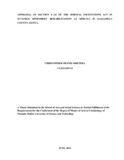| dc.description.abstract | With modernization and industrialization, the magnitude and complexity of crimes committed by juvenile offenders has changed over time. This prompted governments and other international institutions such as the United Nations to come up with measures to address challenges of Juvenile crime. Therefore, as a response to challenges of Juvenile crime, the government established institutions to address Juvenile crime in Kenya. These institutions aim at disciplining the child, provision of spiritual nourishment, academic training and to equip the child with useful skills and knowledge upon release. Consequently, in Kenya section 4 (b) of the Borstal Act recommends trainings in education, industry and agriculture as measures for juvenile offender rehabilitation. The purpose of the study was to appraise reform trainings as stipulated in this section of the Act. The specific objectives of the study were: to establish the needs of juvenile offenders undergoing training in Shikusa Borstal Institution in Kakamega County, Kenya, to assess the learning environment settings influencing training of juvenile offenders of Shikusa Borstal in Kakamega County and to evaluate the state of training facilities at the disposal of juvenile offenders undergoing training at Shikusa Borstal in Kakamega County. This study was guided by the Social Disorganization and Conflict theories. These two theories are instrumental in recommending the prescription of establishing juvenile rehabilitation institutions and rolling out of reform trainings. The theories further recommend restorative justice other than punishment in the reformation of juvenile offenders. The study used stratified random sampling to identify a sample of 100 juvenile offenders and 18 instructors and teachers from a population of 312. Data was collected using questionnaire and interview schedule. This was a descriptive research study focusing on the opinion of respondents on performance of reform trainings. The study drew response from 99 Juvenile offenders in Shikusa Borstal and 18 teachers/instructors of the institution. Study data was analyzed and presented using descriptive statistics with the aid of the statistical package for the social sciences (SPSS) version 23 for windows. Study findings revealed that reform trainings met the needs of offenders in Shikusa Borstal Institution thereby had a positive influence on their reform. Under the first objective 76.42% of the respondents indicated that their needs were met thereby having a positive influence in character reformation. Study findings further revealed that the learning environment at Shikusa Borstal had a negative influence on juvenile offender reform. Majority of the respondents that is 76.77% expressed their displeasure with the learning environment. In the third objective, 64.75% of respondents revealed that the state of training facilities was low and therefore had a negative reflection on the reform of juvenile offenders in the institution. The study therefore recommends that juvenile offenders be involved on the onset in the selection of training before they are enrolled. The study further recommends the need to re-design learning environment settings in a manner that fosters free learning devoid of fear and intimidation. Finally, the institution should set aside a budget for the improvement of the state of training facilities and purchase of new equipment to lend more credence to overall training outcomes and rehabilitation of juvenile offenders. In the overall conclusion the study established that reform trainings as stipulated in section 4 (b) of the Borstal Institutions Act are relevant in reformation of juvenile offenders but the learning environment along with appropriate facilities jeopardized the noble objective of character reformation. | en_US |

